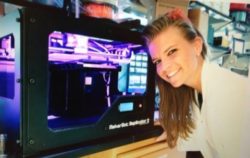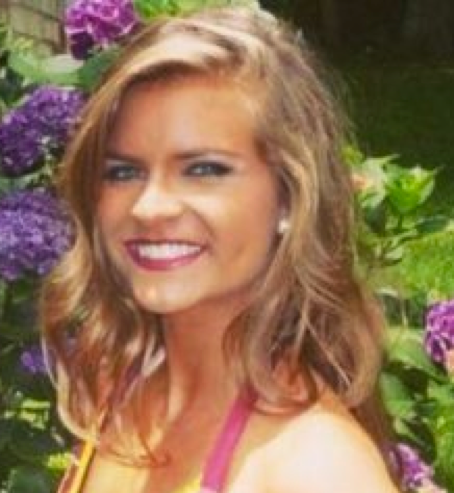Hi SciCheer fans, Samantha here! I would like to introduce you to our newest Science Cheerleader, Heather. A Redskins fanatic and Neurocience Ph.D. candidate!

What turned you on to science and when?
It is difficult to pinpoint when I was turned on to science because I have always been fascinated by the world around me. As a young girl, I had a wooden bug box that I would carry around with me outside to capture and release all types of critters in order to get a closer look at them. As soon as I was eligible at the age of 12, I submitted an application to become a volunteer at my local nature center. I learned all about local wildlife and plants, was trained in animal care, and mentored young children during nature day camps.
What do you do?
I am in my final year of my PhD, and I am currently spending a lot of my time in the lab working towards completing the research for my dissertation. For my current project, I use a magnetic resonance imaging (MRI) machine specifically made for small mammals to evaluate changes in the circuitry of the brain following drug exposure. The goal of my work is to identify new regions of the brain associated with phases of addiction so that future experiments can explore whether interventions like transcranial magnetic stimulation (TMS) can reduce drug abuse.
What does it mean for you to work in science?

After graduating from the University of Mary Washington with a B.S. in Biology, I applied and was accepted to the Postbaccalaureate Intramural Research Training Award (IRTA) program at the National Institutes of Health (NIH) in Bethesda, Maryland. As a postbaccalaureate at the NIH, I worked under the Clinical Director of the Schizophrenia Research Program. The patients that I met during my two years as a postbaccalaureate are why I do the research that I do. After listening to the stories of these patients and discovering the magnitude of derailment that schizophrenia had caused in their lives and the lives of their families, I have gained invaluable insight into this devastating illness that I could not have acquired otherwise. Through my research, I hope to provide clinically relevant insight into the fundamental neural circuit mechanisms underlying neuropsychiatric illness to guide the development of more effective treatments.
What does a cheerleader ambassador do?
The Washington Redskins Cheerleader Ambassadors are an extension of the Washington Redskins Cheerleaders. The main role of an Ambassador is to interact with the fans in the suites and stands at FedEx Field on game day. Ambassadors also have several opportunities to make appearances around the DC metropolitan area.
Why did you try out to be an ambassador?
I tried out to be a Washington Redskins Cheerleader Ambassador because I love meeting new people and have been a lifelong Redskins fan. I loved getting the opportunity to be at FedEx Field on game day to meet and interact with some of the best and loyal fans in the NFL! Hail!
How do the qualities that make you a great ambassador benefit you in your science career?
Determination, resiliency, hard work and enthusiasm have been instrumental in my successes as both a Cheerleader Ambassador and a doctorate student. Being able to engage an audience is also very important. I have had the privilege to travel to several domestic and international conferences to present my research and it is imperative to be able to effectively communicate my findings to the scientific community.
How do you feel about breaking down negative stereotypes about cheerleaders?
I believe that every woman should pursue what makes her happy in life and to never let stereotypes dictate what they choose to do. Being authentic to yourself is what counts and will ultimately perpetuate a healthy mind, body and spirit.
Best STEM-related experience?
My proudest moment has been the publication of my co-first author manuscript in the scientific journal, Neuropsychopharmacology.
What advice would you give your 12-year-old self?
Always have the courage to pursue your dreams. Everyone who aims high will experience both highs and lows. Putting yourself on the line is what counts! The possibility of failure is what makes success so worthwhile. When you do experience a setback, stride forward with confidence that your eventual success will be all the sweeter!
What’s one thing people might find especially surprising about you?
I’m a certified PADI Advanced Open Water Scuba Diver!

